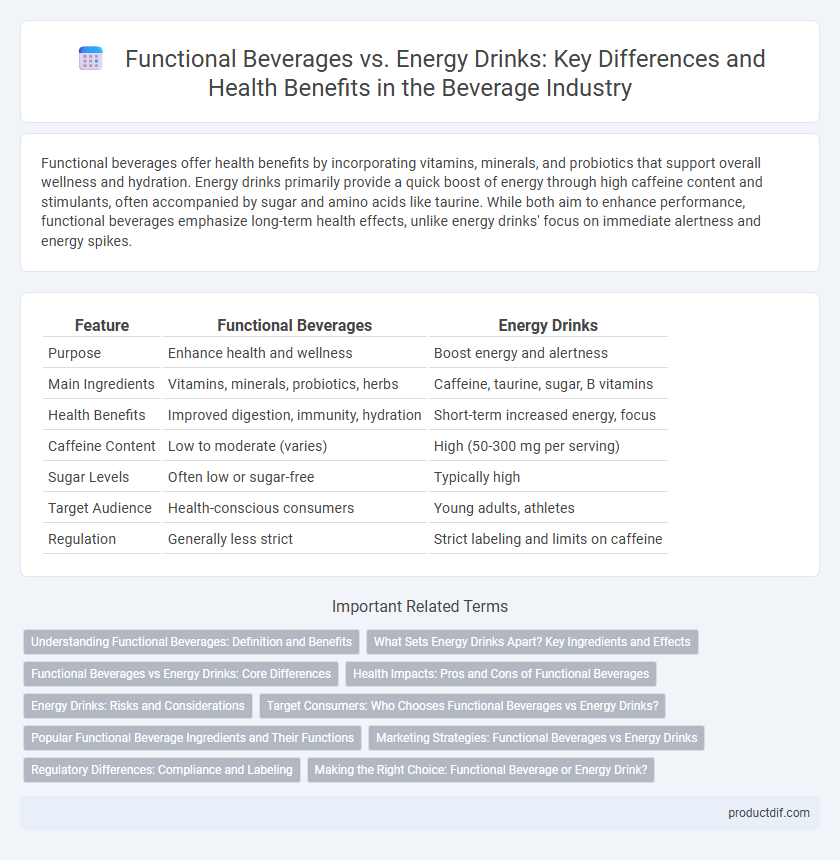Functional beverages offer health benefits by incorporating vitamins, minerals, and probiotics that support overall wellness and hydration. Energy drinks primarily provide a quick boost of energy through high caffeine content and stimulants, often accompanied by sugar and amino acids like taurine. While both aim to enhance performance, functional beverages emphasize long-term health effects, unlike energy drinks' focus on immediate alertness and energy spikes.
Table of Comparison
| Feature | Functional Beverages | Energy Drinks |
|---|---|---|
| Purpose | Enhance health and wellness | Boost energy and alertness |
| Main Ingredients | Vitamins, minerals, probiotics, herbs | Caffeine, taurine, sugar, B vitamins |
| Health Benefits | Improved digestion, immunity, hydration | Short-term increased energy, focus |
| Caffeine Content | Low to moderate (varies) | High (50-300 mg per serving) |
| Sugar Levels | Often low or sugar-free | Typically high |
| Target Audience | Health-conscious consumers | Young adults, athletes |
| Regulation | Generally less strict | Strict labeling and limits on caffeine |
Understanding Functional Beverages: Definition and Benefits
Functional beverages are drinks formulated with added vitamins, minerals, herbs, or other bioactive compounds designed to provide health benefits beyond basic nutrition. These beverages target specific wellness goals such as improved digestion, enhanced immunity, or stress relief, making them popular among health-conscious consumers. Unlike energy drinks, which primarily deliver caffeine and stimulants for immediate energy boosts, functional beverages prioritize long-term health and physiological support.
What Sets Energy Drinks Apart? Key Ingredients and Effects
Energy drinks distinguish themselves from other functional beverages through high caffeine content, taurine, and B vitamins, which collectively enhance alertness, endurance, and cognitive performance. Unlike typical functional beverages that may focus on hydration or nutrient replenishment, energy drinks provide rapid stimulation and increased energy levels, often via sugar or artificial sweeteners. The pronounced stimulant effects and targeted ingredients make energy drinks a preferred choice for quick bursts of energy and mental focus during physical or mental exertion.
Functional Beverages vs Energy Drinks: Core Differences
Functional beverages primarily offer health benefits such as improved digestion, hydration, or mental clarity through ingredients like probiotics, vitamins, and herbal extracts. Energy drinks focus on boosting energy and alertness with high levels of caffeine, sugar, and stimulants like taurine or guarana. Functional beverages generally emphasize long-term wellness and nutritional value, whereas energy drinks target short-term stimulation and performance enhancement.
Health Impacts: Pros and Cons of Functional Beverages
Functional beverages deliver essential nutrients and bioactive compounds like vitamins, minerals, antioxidants, and probiotics, supporting hydration, immune function, and digestive health. Unlike energy drinks, they typically contain lower levels of caffeine and sugar, reducing risks of jitteriness, cardiovascular stress, and insulin spikes. However, overconsumption or misconceptions about their benefits can lead to nutrient imbalances or minimal health improvements without a balanced diet.
Energy Drinks: Risks and Considerations
Energy drinks contain high levels of caffeine and sugar, which can lead to increased heart rate, elevated blood pressure, and potential risk of heart palpitations or arrhythmias. Excessive consumption is linked to sleep disturbances, anxiety, and dehydration, especially when combined with alcohol or physical exertion. Consumers should consider the health implications and consult healthcare professionals before regular intake, particularly individuals with preexisting cardiovascular conditions.
Target Consumers: Who Chooses Functional Beverages vs Energy Drinks?
Health-conscious individuals and wellness enthusiasts primarily choose functional beverages for their added benefits such as vitamins, probiotics, and antioxidants that promote overall well-being. In contrast, energy drinks attract younger consumers, athletes, and professionals seeking immediate stimulation and increased alertness through high caffeine and sugar content. Market research shows that functional beverages appeal to those aiming for long-term health improvements, while energy drinks cater to short-term energy boosts and mental performance enhancement.
Popular Functional Beverage Ingredients and Their Functions
Popular functional beverage ingredients include adaptogens like ashwagandha for stress reduction, antioxidants such as green tea extract to combat oxidative damage, and electrolytes like potassium and magnesium for hydration support. Energy drinks primarily feature stimulants like caffeine and taurine to boost alertness and physical performance, while functional beverages emphasize vitamins, minerals, and herbal extracts that promote overall wellness and targeted health benefits. Ingredients such as ginseng enhance cognitive function, B vitamins support metabolism, and probiotics improve digestive health, distinguishing functional beverages from traditional energy drinks.
Marketing Strategies: Functional Beverages vs Energy Drinks
Marketing strategies for functional beverages emphasize health benefits and natural ingredients, targeting wellness-conscious consumers through educational campaigns and influencer partnerships. Energy drinks utilize bold branding, high-energy messaging, and sponsorship of extreme sports to appeal to younger demographics seeking stimulation and performance enhancement. Both categories leverage digital marketing, but functional beverages focus on trust and lifestyle integration while energy drinks prioritize excitement and immediate energy appeal.
Regulatory Differences: Compliance and Labeling
Functional beverages and energy drinks face distinct regulatory requirements, particularly in compliance and labeling standards set by authorities like the FDA and EFSA. Functional beverages often require substantiated health claims and ingredient transparency, whereas energy drinks must adhere to strict limits on caffeine content and explicit warnings about consumption risks. Accurate labeling ensures consumer safety and helps differentiate product categories under specific regulatory frameworks.
Making the Right Choice: Functional Beverage or Energy Drink?
Functional beverages provide targeted health benefits through ingredients like vitamins, antioxidants, and adaptogens that support hydration, immunity, and mental clarity. Energy drinks primarily deliver a rapid boost in alertness and stamina with high caffeine and sugar content, which can cause jitteriness and energy crashes. Choosing the right option depends on the desired effect--sustained wellness and nutrient supplementation favor functional beverages, while temporary energy spikes align with energy drinks.
Functional Beverages vs Energy Drinks Infographic

 productdif.com
productdif.com